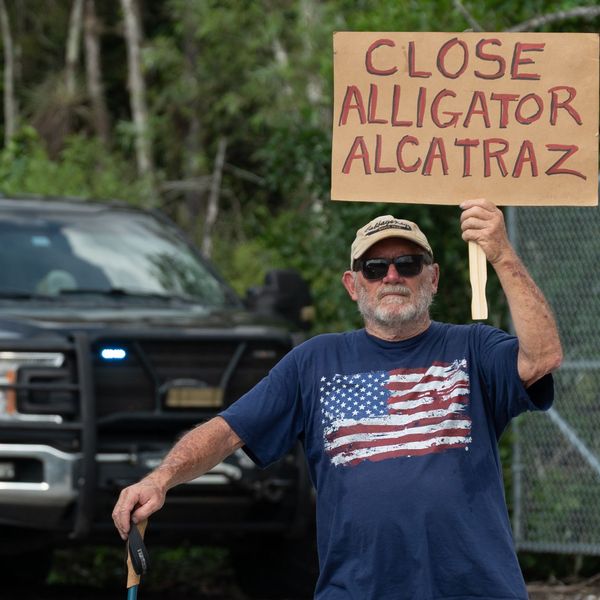BRATISLAVA - A former
Guantanamo Bay prisoner at a refugee detention center in Slovakia has
said he is prepared to die in hunger strike after living five months in
conditions
he says are worse than in the infamous U.S. prison.
Adil
Al-Gazzar, one of three former Guantanamo Bay prisoners on hunger
strike at a detention facility in Medvedov, western Slovakia, told IPS:
"I am
feeling weak and sick and getting worse. But I am not going to stop
until I get
a resolution to my problems, and I will go on with my hunger strike
until I die
if I must." The strike entered its tenth day Friday.
Egyptian Al-Gazzar, Azerbaizani Poolad Tsiradz and Tunisian Rafik
Al-Hami
arrived in Slovakia in January after Slovak authorities agreed to take
the
detainees under an EU-U.S. agreement as U.S. President Barack Obama
tried
to close down the controversial jail in Cuba.
All three were held for years at the prison. They claim they had been
wrongly
interned, and deny being terrorists.
But Al-Gazzar, a former Egyptian soldier who lost a leg after an attack
by U.S.
forces in Afghanistan in November 2001 when he was a volunteer for the
Red
Crescent in the country, said that since arriving all three have been
denied
basic freedoms on a scale worse than anything they experienced at
Guantanamo.
He told IPS: "Conditions here are worse than in Guantanamo, I can say
that
with no hesitation. In Guantanamo I was allowed to be outside for 20
hours a
day. Here I am allowed to go out only for one hour. I have no idea why.
In
Guantanamo I was allowed to pray with other Muslims in a mosque but here
that is not allowed either. They say it would be a security risk. Why? I
do not
understand.
"No one from the Slovak authorities has spoken to us. When I ask about
all
these things they keep saying the same thing - that they do not have
time to
talk to us."
Other refugees at the holding facility have been ordered not to speak to
the
three men, and local media have reported that when they are allowed out
for
their one hour, they are followed by armed guards. The three men also
complain they are kept in isolation and only allowed visits from their
lawyers.
There have also been claims that the trio were misled by Slovak
authorities
about how long they would have to stay at a holding facility when they
arrived
in Slovakia. Al-Gazzar told a local journalist that the men were not
told they
would be held in detention but that they would be free with some
restrictions.
When they came to Slovakia, he said, they were told they had to stay six
months in an asylum facility. Now they have been told they face another
half a
year in a different facility.
In cases where Guantanamo Bay prisoners have been relocated to other
countries in Europe they have, according to activists following the
former
prisoners' fates, been provided with housing within weeks, and able to
live
freely and receive help with integration into society.
Al-Gazzar told IPS: "In other countries people like us get spending
money,
housing and Internet connections. We are not allowed the Internet. Why
not?
They will not tell us."
Rights organizations have condemned the authorities' failure to grant
them
any legal status even though they have been in the country five months
now.
They also question why the men are being held at a detention facility
even
though when they arrived in Slovakia the Foreign Ministry publicly
stated they
were not criminals.
Branislav Tichy, head of Amnesty International in Slovakia, told IPS:
"The
prisoners have said that the conditions they face here in Slovakia are
worse
than those in Guantanamo. Their largest concern, though, is with their
very
unclear status and this is why they are hunger strike. We have spoken to
the
authorities and they have told us that their 'status is being decided at
the
moment' - five months after they arrived.
"They say that they have not had this kind of situation before and so
there is
nothing that they can compare it with. The normal processing time for
asylum
applicants is three months, but the authorities say that they are not in
any
asylum procedures, so their status is unclear. This is what we, and the
three
men, want resolved. Amnesty has been calling on the authorities to
resolve
this from the day they arrived here."
Some observers say that their treatment raises questions over whether
the
Slovak authorities are looking after them as they should.
The Slovak Interior Ministry's Migration Office which is dealing with
the men's
cases has denied the trio's claims, and said they are suffering from
post-
traumatic stress.
Bernard Priecel, head of the Migration Office, told local media the men
"enjoy
high standards in terms of both security and the re-integration process
itself
and are receiving personal treatment eight hours a day, including
psychological care and lessons in the Slovak language."
Following the hunger strike the Interior Ministry has suggested the men
may
now be moved to a boarding house.
Al-Gazzar remains defiant and says that until someone from the Slovak
authorities speaks to him and resolves his lack of freedom and status in
Slovakia, he will continue to refuse food.
"All I want is my freedom and for my status to be resolved," he told
IPS.


